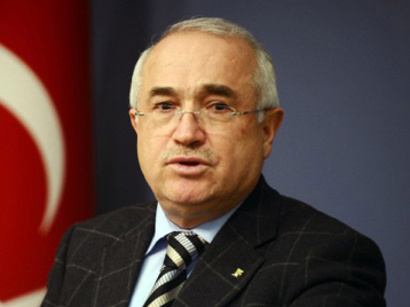Azerbaijani reps meet Turkish speaker

Azerbaijani delegation has met Speaker of Turkish Grand National Assembly (parliament) Cemil Çiçek on the 21st anniversary of the Khojaly genocide committed against Azerbaijanis by Armenians during the 1990s war.
Azerbaijani Presidential Administration's Social and Political Department Chief Ali Hasanov, MPs Ganira Pashayeva, Musa Gasimli, Head of Department of ANAS, Professor Rena Mirzazade, Turkish MPs Sinan Ogan, Ali Ozgunduz, Necdet Unuvar, Azerbaijani ambassador to Turkey Faig Bagirov and chairman of Turkish-Azerbaijani Association Bilal Dunder spoke about the Khojaly genocide at the meeting.
Cemil Çiçek said that Khojaly massacre is not a slur and lie. These 20th century atrocities were proved by documents and eyewitnesses."We feel grief of Azerbaijanis in our hearts. The Turkish Parliament is very sensitive on the issue of Khojaly massacre. Peaceful Azerbaijanis were subjected to massacre and atrocities in Khojaly. The perpetrators of this crime are the President of Armenia and others."
Çiçek stressed that there were still double standards in this issue. "The guilty must not go unpunished," he stressed.
The speaker also said that Azerbaijan`s one million refugees have been living in miserable and hard conditions. The Turkish Parliament have discussed Nagorno Karabakh problem on different platforms.
Ali Hasanov has expressed his satisfaction on behalf of the government of Azerbaijan for commemorating Khojaly massacre by Turkish President Abdullah Gül, Prime Minister Recep Tayyip Erdogan and Turkish Parliament Speaker Cemil Cicek.
On Feb.25-26 February, 1992, Armenian occupation forces together with the 366th infantry regiment of Soviet troops stationed in Khankendi (previously Stepanakert) committed an act of genocide towards the population of the Azerbaijani town of Khojaly.
Some 613 people were killed including 63 children, 106 women and 70 old men. A total of 1,000 civilians were disabled during the genocide. Eight families were killed, 130 children lost one parent and 25 lost both. Additionally, 1,275 innocent residents were taken hostage, while the fate of 150 remains unknown.
